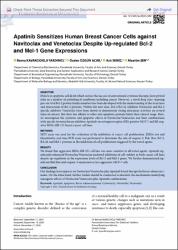| dc.contributor.author | Kavakcioglu Yardimci, Berna | |
| dc.contributor.author | Ozgun Acar, Ozden | |
| dc.contributor.author | Semiz, Asli | |
| dc.contributor.author | Sen, Alaattin | |
| dc.date.accessioned | 2022-02-16T12:39:41Z | |
| dc.date.available | 2022-02-16T12:39:41Z | |
| dc.date.issued | 2021 | en_US |
| dc.identifier.issn | 1300-7467 | |
| dc.identifier.uri | https //doi.org/10.5505/tjo.2020.2380 | |
| dc.identifier.uri | https://hdl.handle.net/20.500.12573/1153 | |
| dc.description | This study was supported by Scientific Research Projects Unit of Pamukkale University (PAU-BAP2019BSP008). | en_US |
| dc.description.abstract | OBJECTIVE
Defects in apoptotic cell death which restrict the success of conventional cytotoxic therapies have pivotal roles in a number of pathological conditions including cancer. However, a novel drug class targeting pro-survival Bcl-2 protein family members has been developed with the understanding of the structures and interactions of Bcl-2 proteins. Within this new class, Bcl-2/Bcl-xL inhibitor Navitoclax and Bcl-2 specific inhibitor Venetoclax have been shown to demonstrate strong anticancer activities on several types of cancers. But their low affinity to other anti-apoptotic proteins limits their clinical usage. Here, we investigated the cytotoxic and apoptotic effects of Navitoclax/Venetoclax and their combinations with specific tyrosine kinase inhibitor Apatinib on estrogen receptor (ER)-positive MCF-7 and ER-negative MDA-MB-231 breast cancer cell lines.
METHODS
MTT assay was used for the evaluation of the inhibition of cancer cell proliferation. ELISA test and Quantitative real-time PCR assay was performed to determine the role of caspase-3, Bak, Bax, Bcl-2, Bcl-xL and Mcl-1 proteins in the inhibition of cell proliferation triggered by the tested agents.
RESULTS
We found that aggressive MDA-MB-231 cell line was more sensitive to all tested agents. Apatinib significantly enhanced Navitoclax/Venetoclax mediated inhibition of cell viability in both cancer cell lines despite up-regulation in the expression levels of Bcl-2 and Mcl-1 genes. We further demonstrated significant Bak/Bax and caspase-3 expression in less aggressive MCF-7 cells.
CONCLUSION
Our findings have impacts on Navitoclax/Venetoclax plus Apatinib based therapy for breast adenocarcinoma. On the other hand, further studies should be conducted to elucidate the mechanisms underlying synergistic effects of Navitoclax/Venetoclax plus Apatinib combinations. | en_US |
| dc.description.sponsorship | Pamukkale University PAU-BAP2019BSP008 | en_US |
| dc.language.iso | eng | en_US |
| dc.publisher | KARE PUBLCONCORD ISTANBUL, DUMLUPINAR MAH, CIHAN SK NO 15, B BLOK 162 KADIKOY, ISTANBUL, TURKEY | en_US |
| dc.relation.isversionof | 10.5505/tjo.2020.2380 | en_US |
| dc.rights | info:eu-repo/semantics/openAccess | en_US |
| dc.subject | Apatinib | en_US |
| dc.subject | Cytotoxicity | en_US |
| dc.subject | Venetoclax | en_US |
| dc.subject | Navitoclax | en_US |
| dc.subject | Apoptosis, Breast adenocarcinoma | en_US |
| dc.title | Apatinib Sensitizes Human Breast Cancer Cells against Navitoclax and Venetoclax Despite Up-regulated Bcl-2 and Mcl-1 Gene Expressions | en_US |
| dc.type | article | en_US |
| dc.contributor.department | AGÜ, Yaşam ve Doğa Bilimleri Fakültesi, Moleküler Biyoloji ve Genetik Bölümü | en_US |
| dc.contributor.institutionauthor | Sen, Alaattin | |
| dc.identifier.volume | Volume 36 Issue 1 Page 8-16 | en_US |
| dc.relation.journal | TURK ONKOLOJI DERGISI-TURKISH JOURNAL OF ONCOLOGY | en_US |
| dc.relation.publicationcategory | Makale - Uluslararası - Editör Denetimli Dergi | en_US |


















